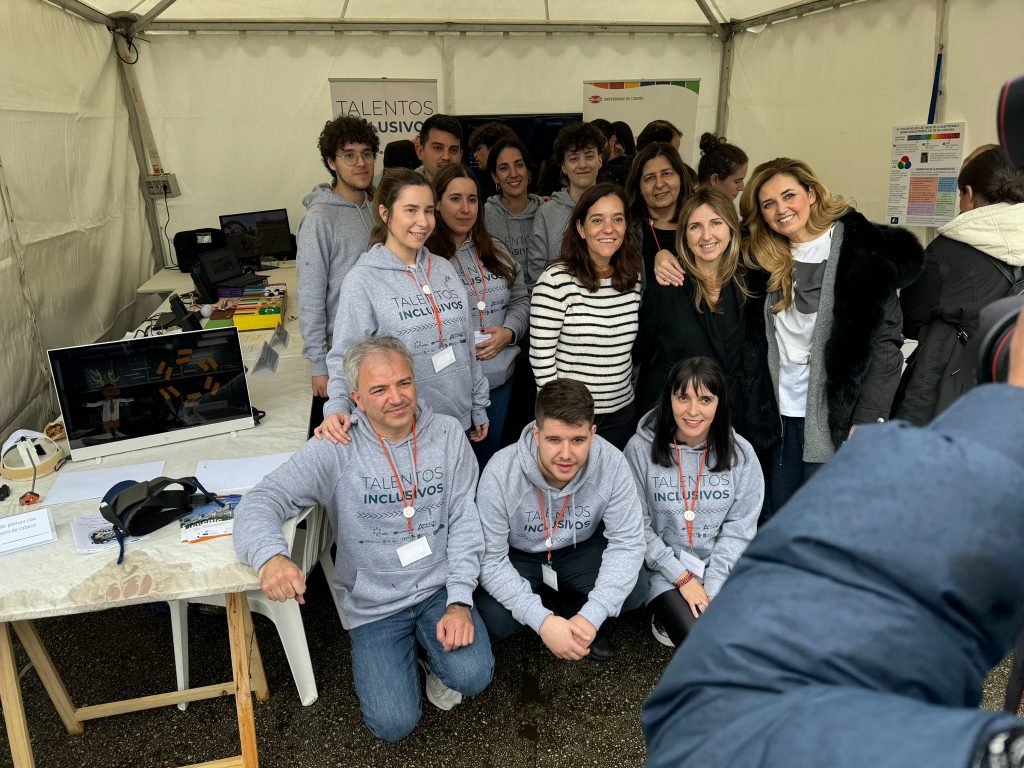
The CITIC, in the Day of Science in the Street
On Saturday May 4, A Coruña celebrated the Day of the Science in the Street with the attendance of a thousand people, demonstrating the responsibility of the city of A Coruña with scientific dissemination and citizen participation. The presence of CITIC one more year in this event, strengthens its role as an active agent in the transfer of knowledge and technology, and highlights its commitment to social inclusion and accessibility.
CITIC joined the celebration with a program designed to foster an interactive and educational experience for all attendees with a focus on inclusive technologies. From early in the morning until sunset, the center offered different activities closely committed to innovation, research and social inclusion.
The circuits and light workshop led by Adriana Dapena and Paula María Castro, CITIC researchers, offered participants a hands-on experience to understand the basic principles of electricity and lighting. In the main tent of CITIC at the event, attendees had the opportunity to immerse themselves in the world of adaptive technology and inclusion through various projects that were explained by research staff from the center. The boys and girls were able to try out games designed for people with disabilities, such as Mario Kart on the Nintendo Switch, which has 3D printing adaptations for the controllers that allow them to be operated through the trunk or head.
In addition, other products using Makey Makey or micro:bit were exhibited by researchers Betania Groba, Patricia Concheiro and María del Carmen Miranda, such as a handmade texture piano or a balance board that allows playing video games using only the movement of the legs. This tool works like a console controller and is made from a balance board that is normally used for physical exercise. “I didn’t know you could play Mario Kart with your head. It’s very difficult for me, but it’s important that all children can enjoy it as I do”, enthusiastically commented Clara, one of the girls who was able to try out the adapted controllers project.
Also on display were the HoloLens or Robobo, the robot that works with the cell phone and was designed by CITIC researchers for use as an educational tool in artificial intelligence and robotics.
In addition to the presentations in the main tent, the CITIC featured Raúl Martínez Díaz’s project, a personalized video game for people with disabilities, in which participants had to classify and drag different objects, frequently found in a house, to the specific space where they belonged. As the participants commented, “it is a tool that allows working on psychomotor skills, as well as concentration, memory and object association”. Diego Darriba, a researcher at CITIC, used a Maqueen Robot to show the youngsters how the device could follow a circuit by giving it guidelines through Microsoft MakeCode, a platform for learning to program online.
Students from IES Maximino Romero de Lema showed the prototype designed as part of the Inclusive Talents program, which is celebrating its fourth edition. The group from the educational center is working on a communicator that, by means of a button, emits a message and, in turn, projects an animated image with artificial intelligence that can be used for everyday tasks, such as asking for water. “The aim of this challenge is to facilitate communication for users with cerebral palsy,” explained Iván, a student at the school.
Science and technology applied to social benefit
Since its inception, the Inclusive Talents project has reflected CITIC’s commitment to developing practical and effective solutions for the real needs of the community, while bringing the reality of people with disabilities closer to youth and society in general.
Innovative projects were also presented, such as GriDall-e, an adaptation of Manuel Lagos and Paula de Santos, researchers at the center, for the generation of images with artificial intelligence. Thus, the children were able to create different drawings with options they could add, such as the background landscape, people or animals, clothing colors or facial expressions. Francisco Rodríguez, who works in 3D character modeling for games in the field of people with disabilities, demonstrated a 3D reindeer animation in the environment of one of the CITIC rooms.
As part of the day, some demonstrations of products designed in past editions of Inclusive Talents were launched, such as painting with head support products, with which the children were able to test their artistic skills.
CITIC’s contribution to the Street Science Day is a clear example of how science and technology can be applied for social benefit. This approach, in addition to promoting accessibility and personal autonomy, underlines the importance of user-centered research in the field of technology, demonstrating that technology can and should be designed for everyone, and ensuring that scientific advances contribute to a more equitable and inclusive society.





